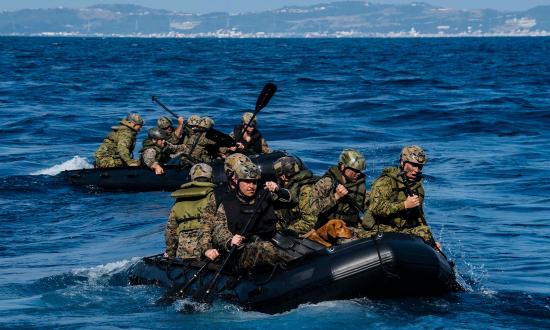For many years, the May issue of Proceedings has been called the Naval Review—the thickest issue of the year, containing recaps of what happened in the Navy, Marine Corps, and Coast Guard over the past year, photos and assignments of the flag and general officers, and the winning essays from the General Prize Essay Contest. Decades ago, the Naval Review was an annual book from the Naval Institute Press that was folded into Proceedings in 1970.
Every year, I look forward to the winning essays from the General Prize Essay Contest. This year’s first-place winner is a name familiar to Proceedings readers over the past 30 years: Captain Sam Tangredi, U.S. Navy (Retired), the director of the Institute for Future Warfare Studies at the Naval War College. Sam is an author gifted at taking complicated topics and making them easier to understand in a naval operational context. In “Sun Tzu Versus AI: Why Artificial Intelligence Can Fail in Great Power Competition,” he cuts through a lot of the hype surrounding artificial intelligence and questions the popular wisdom that AI will “transform warfare.” Not so fast, Sam points out. AI is great in commercial applications—when the data inputs are not expected to be spoofed or corrupted—but what happens when the enemy is purposefully contaminating data coming through sensors? I’m reminded of a phrase I learned years ago: Garbage in equals garbage out. Garbage at machine speed is still garbage. Sam also won the contest in 2000, when it was called the Arleigh Burke Essay Contest.
Lieutenant Commander Evan Karlik, U.S. Navy, took second prize, with “Diving Off the Platform-Centric Mind-set” (pp. 26–31), in which he points out that the software loads on Navy ships must be more easily upgraded—like smartphones and Tesla automobiles. Coast Guard Chief Petty Officer Phillip Null took third prize, with “The Fallacy of Presence” (pp. 32–36)—a fascinating look at the limitations of presence operations when not backed up by hard power.
This month’s American Sea Power Project article is Seth Cropsey’s “The U.S. Role on the Global Stage” (pp. 66–71). Cropsey served in senior roles in the Defense Department during multiple administrations, including Deputy Undersecretary of the Navy for Policy during the presidency of Ronald Reagan. He reviews the history of how “the U.S. rise to world power . . . occurred not by intent, but as a series of mistakes.” And, he argues, now that the nation plays a central role in the world, “it must not walk, or be pushed, away.”
Last summer, in the midst of nationwide racial tension in the aftermath of the death of George Floyd, the Naval Institute announced its first-ever Diversity and Inclusion Essay Contest, sponsored by Raytheon Technologies. The response to that contest was overwhelming—more than 120 entries from men and women of all ranks in the Sea Services. Ensign Sydney Frankenberg, a member of the Naval Academy Class of 2019, took first prize with “Sir, No Excuse, Sir!” (pp. 40–45), a call for the Academy to emphasize the history and contributions of minorities in its curricula. Immediately preceding Ensign Frankenberg’s essay is a statement ,“On the Importance of Diversity and Inclusion” (pp. 38–39), from the Naval Institute Board of Directors and Editorial Board. It is rare for our boards to issue a public statement—this is the first one since I joined the Proceedings team in 2016, and it makes me proud to be part of this organization.
Finally, please join us online on 19 May for the Naval Institute’s annual meeting. Like last year, the meeting will be a virtual event. We look forward to honoring the Proceedings, Naval History, and Naval Institute Press Authors of the Year and the winners of the General Prize Essay Contest. To register and find out more, go to www.usni.org/events/2021-us-naval-institute-annual-meeting.








